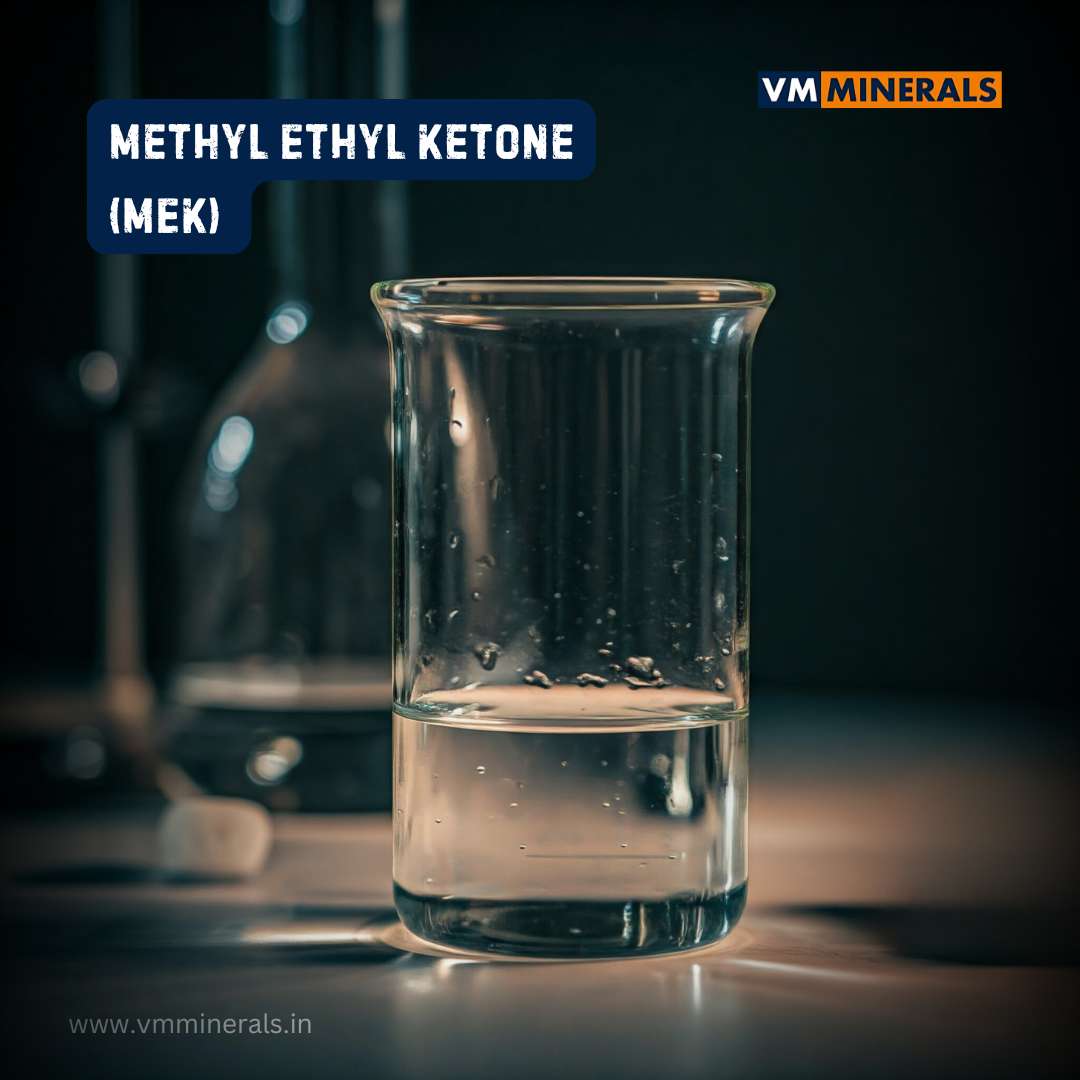Methyl Ethyl Ketone (MEK) by VM Minerals: Properties, Applications, and Safety
Introduction to Methyl Ethyl Ketone (MEK)
Methyl Ethyl Ketone (MEK), also known as Butanone, is a highly efficient solvent with the chemical formula C₄H₈O. Known for its fast evaporation and excellent solvency, MEK is widely used in industrial cleaning, coatings, and chemical synthesis. As a trusted supplier, VM Minerals delivers premium-quality MEK tailored to diverse industrial needs.
MEK Formula and Structure
What is the Chemical Formula of MEK?
The chemical formula of Methyl Ethyl Ketone is C₄H₈O, comprising four carbon atoms, eight hydrogen atoms, and one oxygen atom.
Structural Representation of Methyl Ethyl Ketone
The structure of MEK includes a ketone group (-CO) attached to a butane backbone.
Structure: CH₃COCH₂CH₃
Chemical Composition and Characteristics
- MEK is a colourless, volatile liquid with a sharp, sweet odour.
It is miscible with water, alcohols, and most organic solvents, making it versatile for various applications.
Physical and Chemical Properties of MEK
Boiling Point and Melting Point of MEK
- Boiling Point: Approximately 79.6°C (175.3°F)
- Melting Point: -86°C (-122.8°F)
Density, Solubility, and Other Properties
- Density: 0.805 g/cm³ at 20°C
- Appearance: Clear, colourless liquid
- Solubility: Fully miscible with water and organic solvents like acetone and ethanol.
Chemical Reactivity and Behaviour
- MEK is flammable and reacts with strong oxidizing agents.
It is a stable compound under standard conditions but should be stored properly to avoid degradation.
Applications of Methyl Ethyl Ketone
Use in Paints, Coatings, and Adhesives
MEK is a critical solvent for:
- Paint formulations: Enhances flow and drying properties.
- Industrial coatings: Provides excellent solubility for resins and polymers.
- Adhesives: Improves bonding strength and consistency.
Role in Printing Inks, Rubber, and Plastics
- Printing inks: Ensures smooth application and rapid drying.
- Rubber processing: Acts as a processing aid and cleaner.
- Plastics: Used in the production and finishing of plastic components.
Application in Industrial Cleaning and Degreasing
MEK effectively removes grease, oils, and residues from machinery, tools, and surfaces.
Use in Chemical Synthesis and Pharmaceutical Processes
- Chemical synthesis: Serves as a reagent in producing various chemical intermediates.
- Pharmaceuticals: Acts as a solvent in drug manufacturing processes.
Why Choose VM Minerals for MEK?
High-Quality Standards for Consistent Performance
VM Minerals provides high-purity MEK, ensuring reliable results in industrial and laboratory applications.
Reliable Supply Chain and Custom Solutions
We offer timely deliveries and customized packaging to meet your specific needs.
Dedicated Technical Support and Timely Deliveries
Our team is committed to delivering exceptional customer service and technical expertise.
Safety and Storage Guidelines for MEK
Potential Health Hazards and Precautions
- Inhalation of vapours may cause dizziness and respiratory irritation.
- Prolonged skin contact can result in dryness or irritation.
- Use MEK in well-ventilated areas and wear appropriate protective equipment (PPE).
Proper Storage, Handling, and Transportation Methods
- Store MEK in tightly sealed containers, away from heat and open flames.
- Ensure proper ventilation in storage areas to prevent vapor build-up.
- Follow local regulations for safe transportation and disposal.
Environmental Impact of MEK
Biodegradability and Environmental Concerns
MEK is partially biodegradable but requires proper handling and disposal to minimize environmental impact.
Compliance with Global Environmental Standards
VM Minerals ensures that our MEK complies with international environmental safety regulations.
Comparison with Other Solvents
MEK vs. Acetone
- MEK: Slower evaporation, better for coatings and adhesives.
- Acetone: Faster evaporation, preferred for quick-drying applications.
MEK vs. Toluene
- MEK: More polar, better for dissolving resins and polymers.
Toluene: Non-polar, ideal for specific industrial uses.
Reactions Involving MEK
Combustion of Methyl Ethyl Ketone
MEK combusts in oxygen to produce carbon dioxide and water.
Reaction:
C₄H₈O + 6O₂ → 4CO₂ + 4H₂O
Reactions in Chemical Synthesis
MEK is involved in aldol condensation and other reactions to produce chemical intermediates.
Frequently Asked Questions (FAQs)
What is Methyl Ethyl Ketone Used For?
MEK is used in paints, coatings, adhesives, cleaning, and chemical synthesis.
What is the Boiling Point of MEK?
The boiling point of MEK is 79.6°C (175.3°F).
How Should MEK Be Stored?
Store MEK in cool, ventilated areas, away from heat and ignition sources.
Is MEK Environmentally Friendly?
While MEK is biodegradable, proper handling is essential to minimize environmental risks.
Why is MEK Preferred in Coatings and Adhesives?
MEK’s solvency and controlled evaporation make it ideal for high-performance finishes.
How Does MEK Compare to Other Solvents?
MEK offers slower evaporation and better solvency for polymers compared to acetone and other solvents.
Specifications
| Parameter | Specification |
|---|---|
| Chemical Formula | C₄H₈O |
| Molecular Weight | 72.11 g/mol |
| Purity | ≥ 99% |
| Appearance | Clear, colorless liquid |
| Odor | Sweet, sharp, acetone-like odor |
| Boiling Point | 79.6°C |
| Density | 0.805-0.807 g/cm³ at 20°C |
| Melting Point | -86°C |
| Flash Point | -4°C (closed cup) |
| Refractive Index | 1.378-1.380 at 20°C |
| Solubility | Miscible with water, alcohol, and most organic solvents |
| Moisture Content | ≤ 0.05% |
| Residue on Evaporation | ≤ 0.002% |
| Acidity (as Acetic Acid) | ≤ 0.002% |
| Color (APHA) | ≤ 10 (for high-purity grades) |
Trade Information
| Minimum order | 200 LTRS |
| Supply ability | Upto 50 MT per day |
| Delivery time | 48 Hrs. from the date of payment receipt |
| Payment terms | Advance payment before loading |
| Supply area | Tamil Nadu, Andhra Pradesh, Kerala, Karnataka & Telangana |
| Sample policy | Free samples are available |

